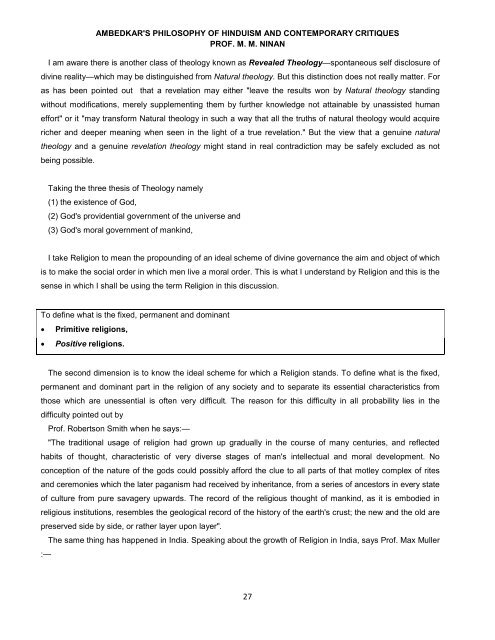Ambedkar-Philosophy of Hinduism
Create successful ePaper yourself
Turn your PDF publications into a flip-book with our unique Google optimized e-Paper software.
AMBEDKAR'S PHILOSOPHY OF HINDUISM AND CONTEMPORARY CRITIQUES<br />
PROF. M. M. NINAN<br />
I am aware there is another class <strong>of</strong> theology known as Revealed Theology—spontaneous self disclosure <strong>of</strong><br />
divine reality—which may be distinguished from Natural theology. But this distinction does not really matter. For<br />
as has been pointed out that a revelation may either "leave the results won by Natural theology standing<br />
without modifications, merely supplementing them by further knowledge not attainable by unassisted human<br />
effort" or it "may transform Natural theology in such a way that all the truths <strong>of</strong> natural theology would acquire<br />
richer and deeper meaning when seen in the light <strong>of</strong> a true revelation." But the view that a genuine natural<br />
theology and a genuine revelation theology might stand in real contradiction may be safely excluded as not<br />
being possible.<br />
Taking the three thesis <strong>of</strong> Theology namely<br />
(1) the existence <strong>of</strong> God,<br />
(2) God's providential government <strong>of</strong> the universe and<br />
(3) God's moral government <strong>of</strong> mankind,<br />
I take Religion to mean the propounding <strong>of</strong> an ideal scheme <strong>of</strong> divine governance the aim and object <strong>of</strong> which<br />
is to make the social order in which men live a moral order. This is what I understand by Religion and this is the<br />
sense in which I shall be using the term Religion in this discussion.<br />
To define what is the fixed, permanent and dominant<br />
• Primitive religions,<br />
• Positive religions.<br />
The second dimension is to know the ideal scheme for which a Religion stands. To define what is the fixed,<br />
permanent and dominant part in the religion <strong>of</strong> any society and to separate its essential characteristics from<br />
those which are unessential is <strong>of</strong>ten very difficult. The reason for this difficulty in all probability lies in the<br />
difficulty pointed out by<br />
Pr<strong>of</strong>. Robertson Smith when he says:—<br />
"The traditional usage <strong>of</strong> religion had grown up gradually in the course <strong>of</strong> many centuries, and reflected<br />
habits <strong>of</strong> thought, characteristic <strong>of</strong> very diverse stages <strong>of</strong> man's intellectual and moral development. No<br />
conception <strong>of</strong> the nature <strong>of</strong> the gods could possibly afford the clue to all parts <strong>of</strong> that motley complex <strong>of</strong> rites<br />
and ceremonies which the later paganism had received by inheritance, from a series <strong>of</strong> ancestors in every state<br />
<strong>of</strong> culture from pure savagery upwards. The record <strong>of</strong> the religious thought <strong>of</strong> mankind, as it is embodied in<br />
religious institutions, resembles the geological record <strong>of</strong> the history <strong>of</strong> the earth's crust; the new and the old are<br />
preserved side by side, or rather layer upon layer".<br />
The same thing has happened in India. Speaking about the growth <strong>of</strong> Religion in India, says Pr<strong>of</strong>. Max Muller<br />
:—<br />
27


















